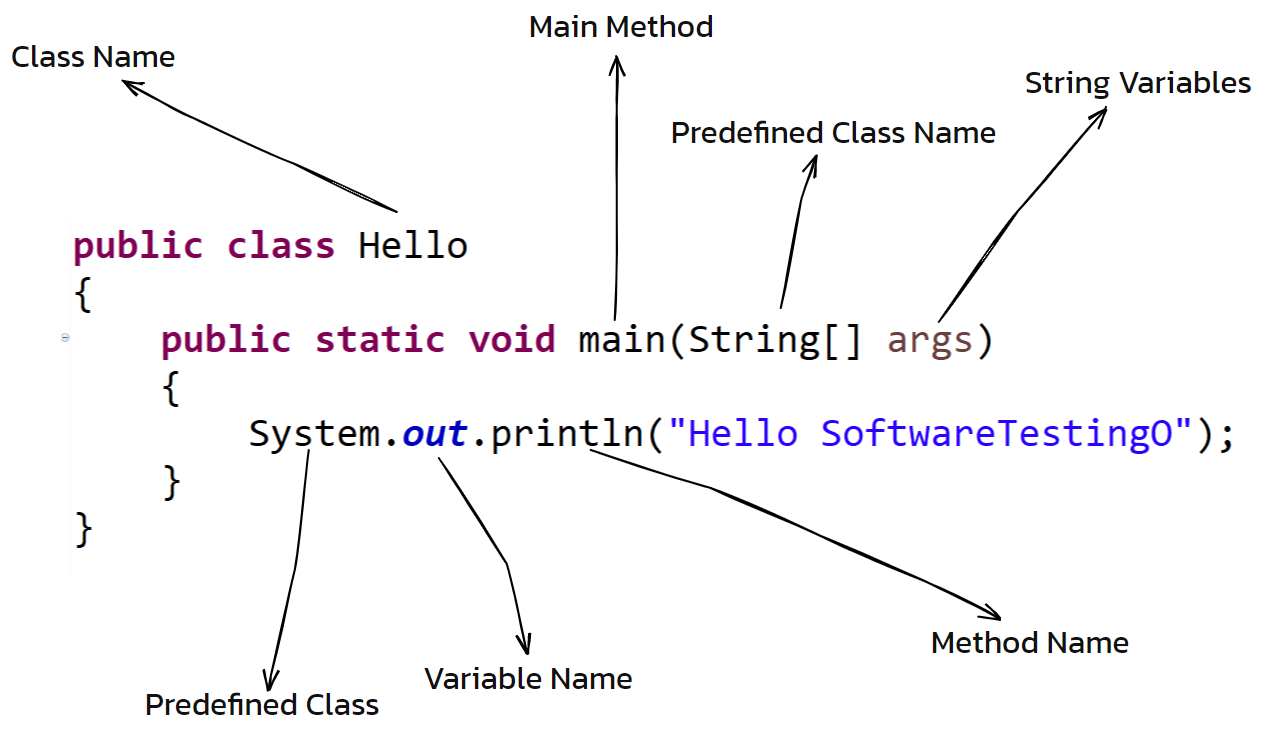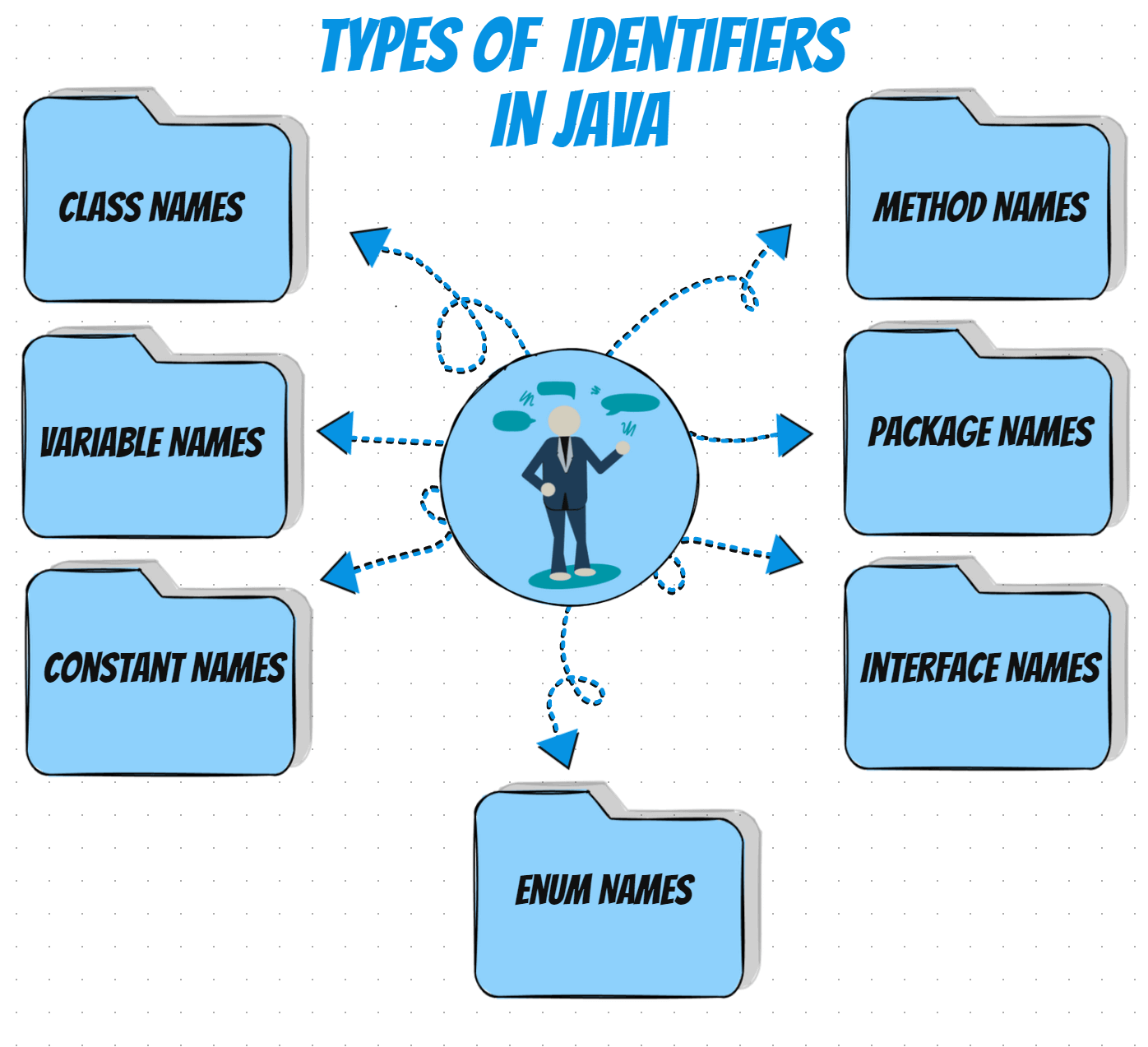Identifiers in Java: In Java programming, identifiers serve as the names that developers assign to various program elements such as classes, methods, variables, and packages. These names are pivotal in making code readable, understandable, and maintainable.
Identifiers provide a way to identify and distinguish different components within a Java program uniquely. This article will explore the concept of identifiers in Java, delving into their significance and the rules governing their creation and usage.
What are Identifiers in Java?
Java identifiers are like names for different components of your Java program, such as variables, classes, and methods. They’re like labels that help you recognize and use them in your code. As names make people unique, identifiers make these program parts distinct and identifiable.
When you use good and clear identifiers, it’s like giving each part a meaningful name so that you and anyone else reading your code can understand what each part does.

Identifiers In Java Rules
- In Java, an identifier is a string of characters that can include letters, numbers, underscores (_), and dollar signs ($).
- An identifier in Java must begin with a letter, underscore (_), or a dollar sign ($) and cannot start with a digit.
- It is not allowed to use Java-reserved words as identifiers in Java.
- The identifiers “true,” “false,” and “null” are also not permitted.
- Identifiers can vary in length, and their size is not limited.
Rules For Naming Identifiers In Java
- Declining a public instance variable or method should start with a lowercase (small) letter—for example, mileage, testing, etc.
- While naming the private and local variables, it should start with the lowercase letter, and if there is more than one word, it should be combined with an underscore (_). Example: manual_testing, learn_java etc.
- All the Class and interface names should start with an Upper case letter; if there are many words, then in that case, the first letter of the other word should be a capital letter—examples: Software, JavaTutorial, IdentifierinJava, etc.
- If the identifier name has more than one word, the second and subsequent words’ first letter should always be uppercase—for example, totalMarks, identifierName, etc.
- If you declare a variable with a constant value, the name of that variable or identifier should be in the CAPITAL letter; if there are multiple words, it should be combined with an underscore—for example, PI, FINAL_AMOUNT, etc.
Picking good identifiers is important because it makes your code easier to read and understand. When you use names that make sense and follow the rules, your code becomes like a story that anyone can follow, not just a bunch of computer instructions.
Types Of Identifiers In Java
These are the main types of identifiers in Java, each with its conventions and rules for naming. Using meaningful and consistent identifiers is essential for writing clean and maintainable Java code.

They follow specific rules and come in different types:
- Class Names: These identifiers are used for naming classes in Java. They should start with an uppercase letter, followed by a combination of letters, digits, or underscores. For Example: MyClass, EmployeeDetails.
- Method Names: Identifiers used for naming methods in Java. They should also start with a lowercase letter, followed by a combination of letters, digits, or underscores. For Example: calculateTotal, getEmployeeName.
- Variable Names: Used for naming variables in Java. Like method names, they should start with a lowercase letter and can contain letters, digits, or underscores—for Example, int age, double salary.
- Package Names: Identifiers used for naming packages in Java. They follow a similar convention to class names, typically in reverse domain name format—for Example, com.softwaretestingo.myapp.
- Constant Names: Constants are typically declared as final variables in Java and are named using uppercase letters with underscores separating words. For Example: MAX_VALUE, PI.
- Interface Names: Identifiers used for naming interfaces in Java. They follow the same rules as class names, starting with an uppercase letter. For Example: Drawable, Serializable.
- Enum Names: Enums are a special type in Java and are typically named using uppercase letters. For example: Color, DayOfWeek.
It’s important to note that Java is case-sensitive, so myVariable and MyVariable are considered different identifiers. Additionally, Java reserves certain keywords that cannot be used as identifiers, like public, static, class, etc.
Conclusion:
Identifiers are the cornerstone of code readability and organization in any programming language. Developers can create robust and comprehensible code by following the naming rules and understanding the different types of identifiers. If you have any doubts about identifiers in Java or suggestions to enhance this article, please comment below. Your feedback is valuable in improving our content.
